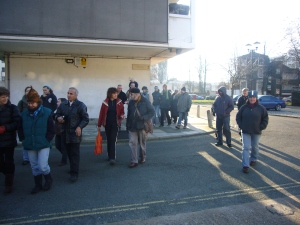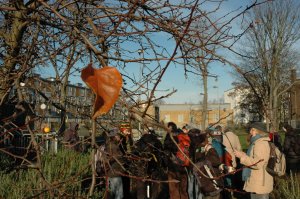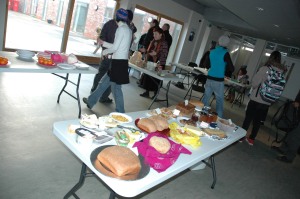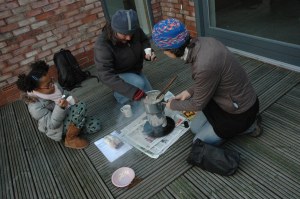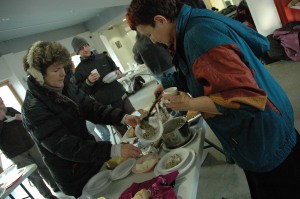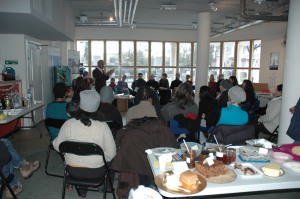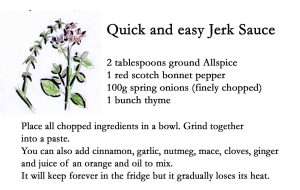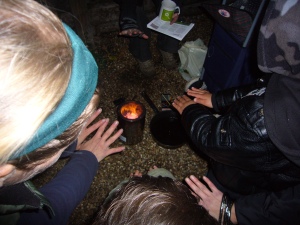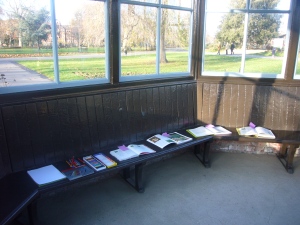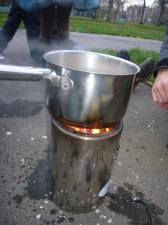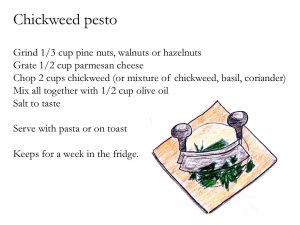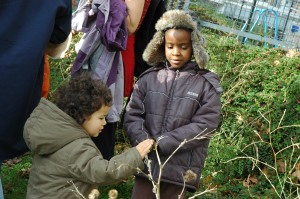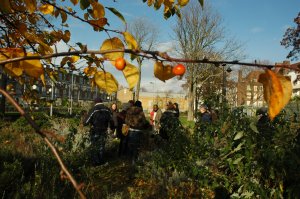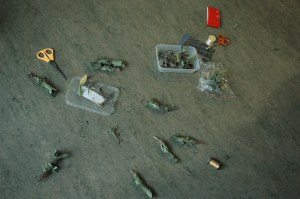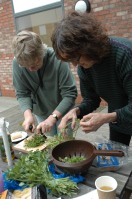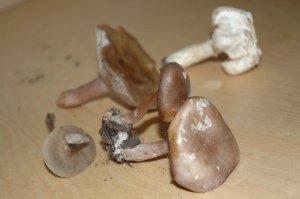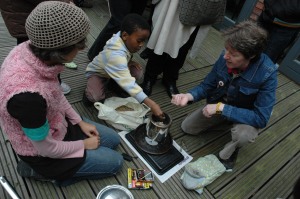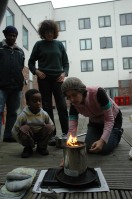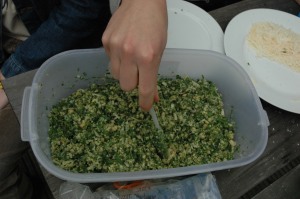Wassailing is a tradition which can be dated back to the 16th century but probably with pagan roots. It’s a custom which blesses the roots of the cider apple tree and asks for plentiful fruit the following year. Some hot cider is poured on the roots and those who wassailed probably drank loads of cider at the same time. Because we are in Brixton, we toasted the trees with hot caribbean christmas sorrel drink as a mark of respect to other delicious cultural traditions.
a basic risotto recipe
ingredients
• approx• 1.1 litres/2 pints stock (chicken, fish or vegetable as appropriate)
• 2 tablespoons olive oil
• 1 large onion, finely chopped
• 2 cloves of garlic, finely chopped
• 400g/14oz risotto rice
• sea salt and freshly ground black pepper
• 70g/2½oz butter
• 115g/4oz freshly grated Parmesan cheese
+ thyme and lemon zest
main courses | serves 6
This is a great recipe for making risotto. You want it to be smooth, creamy and oozy, not thick and stodgy.
stage 1
Heat the stock. In a separate pan heat the olive oil and butter, add the onions, garlic and celery, and fry very slowly for about 15 minutes without colouring. When the vegetables have softened, add the rice and turn up the heat.
stage 2
The rice will now begin to lightly fry, so keep stirring it. After a minute it will look slightly translucent. Add the vermouth or wine and keep stirring — it will smell fantastic. Any harsh alcohol flavours will evaporate and leave the rice with a tasty essence.
stage 3
Once the vermouth or wine has cooked into the rice, add your first ladle of hot stock and a good pinch of salt. Turn down the heat to a simmer so the rice doesn’t cook too quickly on the outside. Add the thyme and lemon zest. Keep adding ladlefuls of stock, stirring and almost massaging the creamy starch out of the rice, allowing each ladleful to be absorbed before adding the next. This will take around 15 minutes. Taste the rice — is it cooked? Carry on adding stock until the rice is soft but with a slight bite. Don’t forget to check the seasoning carefully. If you run out of stock before the rice is cooked, add some boiling water.
stage 4
Remove from the heat and add the butter and Parmesan. Stir well. Place a lid on the pan and allow to sit for 2 minutes. This is the most important part of making the perfect risotto, as this is when it becomes outrageously creamy and oozy like it should be. Eat it as soon as possible, while the risotto retains its beautiful texture
Then we had the great pleasure to hear poetry from Adnan al-Sayegh. Born in Al-Kufa (Iraq) in 1955, Adnan al-Sayegh is one of the most original voices in Iraqi poetry, indeed in contemporary poetry around the world. His poetry is elegant and incisive and carries an intense passion for freedom love and beauty. Adnan uses his words as a weapon to denounce the devastation of war and the horrors of dictatorship. More here http://www.adnanalsayegh.com
Passage to Exile
The moaning of the train kindles the sorrow of the tunnels
Roaring along the rails of everlasting memories
While I am nailed to the window
With one half of my heart
And the other half on the table
Playing poker with a girl whose thighs are exposed
With shock and pain, she asks
Why my fingers are falling apart,
Like the wood of old coffins,
And hasty, as if they are afraid of not being able to grab anything
I tell her about my homeland
And the banners
And colonization
And the glory of the Nation
And the sex in public bathrooms
Then she leans, with her wet hair, over my tears,
And does not understand
While, in the other corner
Mozart scatters his tones over the snow-covered valleys
My homeland is sad beyond necessity
And my songs are aggressive, refractory, and shy
I will stretch out on the first sidewalk I reach in Europe
And hold my legs up for the pedestrians
To show them the traces of school bastinados, and the ones from jails
Those that got me here
What I carry in my pocket is not a passport
But a history of oppression
Where, for fifty years, we have been chewing animal diet
And speeches
And hand-made cigarettes
As we stand before the gallows
Watching our own hanging corpses
And applauding the rulers
Out of fear for our families
Whose files fill the basements of secret-service buildings
Where the homeland
Begins with the president’s speech
And ends with the president’s speech
And in between, there are the president’s streets, the president’s songs, the president’s museums, the president’s gifts, the president’s trees, the president’s factories, the president’s newspapers, the president’s stable, the president’s clouds, the president’s boot camps, the president’s statues, the president’s bakeries, the president’s medals, the president’s mistresses, the president’s schools, the president’s farms, the president’s weather, the president’s orders …
She will stare for a long time
At my rain and spit moistened eyes
Then she will ask: “What country are you from?!”
ــــــــــــــــــــــــــــــ
From “Carrying his Exile under his Arm” ( Sweden , 2001; Cairo , 2006)
by Adnan al-Sayegh, translated by Stephen Watts and Marga Burgui-Artajo

And finally, rekindling the fire for some marshmallow. The children didn't actually like them that much
This walk was the day after the end of the Copenhagen summit to reach a deal to limit carbon emissions.
This was the Solstice message from Starhawk. It seems very appropriate after the disappointment and failure of the world ‘leaders’ at Copenhagen, who were incapable of acting for the good of the planet, who couldn’t see beyond the limitations of their own struggle for power and held back by fear of how voters, businesses and consumers might react to a genuine, bold shout for the health of the planet and the lives of those who are in the front line of climate change.
Winter Solstice—the longest night of the year. Today, in our Wiccan mythology, the sun is reborn. Each year the Great Mother labors through the long night to give birth again to the new year, to hope and light.
This year the darkness has intense. The bright hopes of last year are worn and tattered from obstructions and betrayals and compromise. Our personal health and the health of all the life support systems of the planet hang in balance, and how can we tell whether we’ve inched forwards or been sucked back into deals and appeasements worse than what went before. Last year we hoped for an end to war—this year we see war escalate. Last year we chose a road of change; this year it looks only too much like the same old road we were on before.
But the message of Solstice is this: hope does not come once into the world and fulfill itself. Hope and light must constantly be reborn, over and over again. They wax and wane, and must be renewed.
That renewal, that birthing, requires labor. Labor means work, commitment, perseverance through that time when it seems you just can’t push any more. The cervix dilates slowly, pang by pang. The child begins to emerge, is drawn back, pushed forward another increment.
We are the laboring Mother, we are the spark of light. New possibilities kick and squirm within us. No, it’s not easy to bring them forth, but we are strong, and we are made for this work. Bear down…breathe…push. This morning the sun rises; each day a new world is born.
